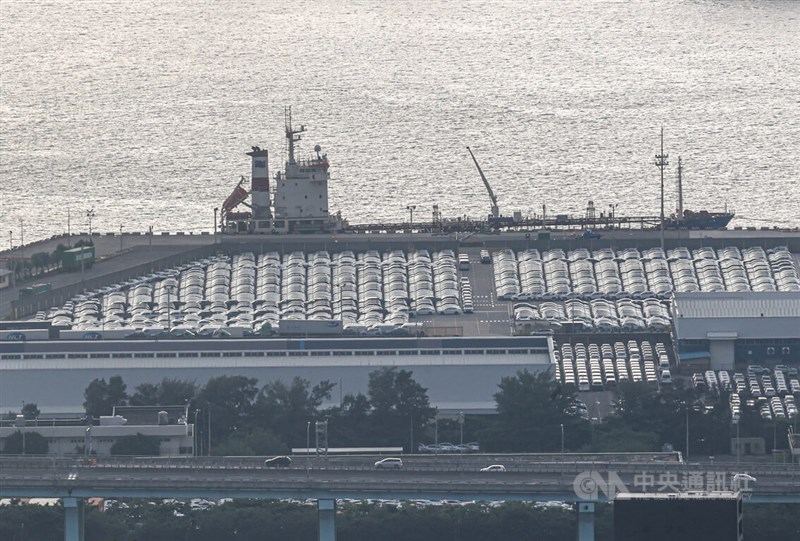
Taipei, Aug. 10 (CNA) Taiwanese industry and labor groups have urged the government to act after the United States began imposing a 20 percent tariff on imports from Taiwan, in addition to existing most favored nation (MFN) duties and other trade remedy tariffs, warning the measures could damage manufacturing and threaten jobs.
The Ministry of Economic Affairs (MOEA) confirmed Friday that exports to the U.S. are now subject to the 20 percent "provisional" tariff on top of existing MFN duties and any anti-dumping or countervailing tariffs, under a July 31 executive order signed by U.S. President Donald Trump.
Although described by the government as "temporary," the tariff took effect Aug. 7 (U.S. time) and has already raised concerns among industry and labor groups, which hope Taipei can negotiate a lower rate.
The additional 20 percent -- higher than the rate for Japan and South Korea -- has sent shockwaves through the manufacturing sector, with reports of factories in industrial parks being put up for sale in large numbers.
The Taipei-headquartered Chinese Federation of Labor (CFL) said Saturday that the "cumulative tariffs" on Taiwanese imports are expected to hit sectors such as machine tools, machinery, ICT, screws, bicycles and textiles especially hard.
Warning the increases could trigger mass unemployment, the CFL called on the government to negotiate with the U.S. to lower the rates.
Price edge weakened
According to the CFL, cumulative tariffs and fluctuations in the Taiwan dollar have eroded the price competitiveness of Taiwanese goods.
"Although prices remain about 10 percent lower than Japanese products, Taiwan struggles to compete on brand and quality," leading to continued losses in orders, it said, adding that Taiwanese goods are now also more expensive than those from South Korea.
The CFL noted that while these industries account for only 20 percent of exports, they support 80 percent of Taiwan's workforce. It urged the government to adopt countermeasures to prevent large-scale relocation overseas, warning that such a shift could trigger a major unemployment crisis.
It also proposed that the government introduce subsidies and transition support for affected workers, relax labor and health insurance requirements, simplify applications for unemployment and unpaid leave benefits, and implement policies to stabilize exchange rates to ease export cost pressures and reduce foreign exchange losses.
Meanwhile, the Chinese National Association of Industry and Commerce (CNAIC) urged the government to quickly clarify how cumulative U.S. reciprocal tariffs are calculated.
It recommended holding explanatory sessions, publishing a comprehensive list of affected products, establishing a dedicated contact center, and streamlining subsidy applications to help industries plan ahead.
Machine tool sector suffers
Also on Saturday, the Taiwan Machine Tool and Accessory Builders' Association (TMBA) said the additional tariff would significantly impact the machine tool industry.
The MFN tariff rate originally applied to Taiwan's machine tool exports to the U.S. was 4.7 percent, according to the MOEA. After adding the 20 percent provisional tariff, the total rate comes to 24.7 percent, it said.
The TMBA called on the government to clarify product classifications, help businesses secure preferential tariff treatment, and propose response measures for the transition period.
Kuo Ai-mei (郭璦玫), chairperson of the Taiping Industrial Park Manufacturers' Association in Taichung, was cited in a United Daily News report as saying that in the U.S. machine tool market, Taiwan's main competitors are Japan and South Korea, both of which have free trade agreements with Washington, meaning they previously enjoyed zero tariffs.
The "reciprocal tariffs" between the U.S. and Japan or South Korea are both 15 percent, while Taiwan's provisional tariff on machine tools is 20 percent.
"Adding the original tariff rate of 4.5 percent brings Taiwan's total tariff rate to 24.5 percent," which is nearly 10 percentage points higher than that of Japan and South Korea, Kuo said.
She added that the Taiwan dollar's exchange rate against the U.S. dollar affects the price competitiveness of exporters worldwide.
In particular, over the past few months, the Taiwan dollar has appreciated by about 13 percent, which is highly unfavorable for exporters, Kuo said, explaining that such appreciation squeezes profit margins.
She expressed hope that the government would allow the Taiwan dollar to depreciate at the right time, as this would be the most direct way to help exporters.
- Society
Hualien quake causes brief transport delays, CWA warns of aftershocks
12/08/2025 09:50 PM - Society
- Business
Chiayi City to submit NT$6,000 cash handout plan for council review
12/08/2025 09:16 PM - Society
CWA forecasts heavy rain Tuesday, temperature drop to 10°C over weekend
12/08/2025 09:13 PM - Society
Taiwan forms clinical trial alliance to accelerate access to new medicines
12/08/2025 09:07 PM